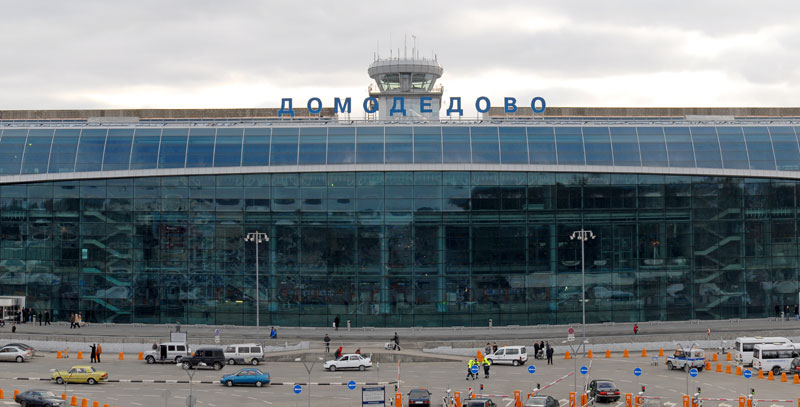
As many as 35 are dead and 130 wounded after an explosion at Moscow’s Domodedovo airport. Terrorism is the working assumption.
Spiegel ("Presumed Terror Attack Kills Dozens at Moscow Airport"):
According to a report by the RIA Novosti news agency, the blast is thought to have been the work of a suicide bomber. Other Russian media have reported that it was planted in a piece of luggage and detonated remotely by a mobile phone.
Russian President Dmitry Medvedev confirmed soon after the attack that officials believe it was a terrorist attack. No group has yet claimed responsibility.
"Security will be strengthened at large transport hubs," Medvedev wrote in a Twitter posting. "We mourn the victims of the terrorist attack at Domodedovo Airport. The organizers will be tracked down and punished." In a television address, Medvedev said that lax security had made the attack possible. The Russian president has delayed his departure for the World Economic Forum in Davos, scheduled for Tuesday.
Domodedovo is the largest of three airports serving the Russian capital. A video distributed by Twitter shows the chaotic scene inside the airport with several small fires barely visible through the thick smoke.
[…]
The airport is located 42 kilometers southeast of the Moscow city center. Despite being seen as the city’s most modern airport, it has been criticized for inadequate security precautions in the past. In 2004, two suicide bombers were able to buy tickets illegally before blowing themselves up in the air. Ninety people were killed in the pair of attacks.
Security across Moscow, particularly in the subway system and transportation hubs, was immediately strengthened in the wake of the Monday attack. In March, 2010, 40 people were killed and 60 injured in two explosions that struck the subways system. The attacks were the work of two female suicide bombers from the instable region of Dagestan
In 2009, Chechen fighters claimed responsibility for detonating a bomb on a high-speed train between St. Petersburg and Moscow. Twenty-six people died in that attack.
More recent attacks in Russia have likewise originated from the North Caucasus, particularly the separatist Caucasus Emirate in the region of Chechnya. Recently, however, there has been a struggle for leadership within the group. Whether it has resulted in a split is unclear. Analysts say that rebels from the North Caucasus planned to step up activity ahead of the 2012 presidential elections in Russia.
Danger Room‘s Spencer Ackerman offers plausible speculation as to how bombers could have avoided airport security:
Russia’s Novosti news service cites eyewitnesses claiming “two terrorists blew themselves up as passengers emerged from the international arrivals zone.” If so, then they picked the softest target that airports have: a place where lots of people congregate, in anticipation of their loved ones’ arrival, without passing through machines to detect chemicals or metallic objects.
These are early reports; much can change. The security analysis organization Stratfor tweets that the location of the bomb isn’t so clear. Admittedly, I’ve never traveled through Domodedovo; maybe there’s a security procedure in the arrivals terminal there I’m not aware of. But the above video of the aftermath, uploaded to YouTube and noticed by the New York Times (thanks, guys) looks like it’s at either an arrival area or a baggage claim.
If Novosti’s early account is correct, then the terrorists who carried out the Domodedovo attack have demonstrated that it’s not necessary to get an explosive on board an airplane to kill and injure lots of people and throw air travel into turmoil. That’s important to consider as the U.S. Department of Homeland Security installs expensive and privacy-infringing “naked scanners” at airport security gates and keeps traveler liquids off of flights. Terrorists of all affiliations have proven that they’ll aim for whatever targets security officials don’t or can’t harden: in 2004, two Chechen terrorists boarded a plane at Domodedovo, killing 88 passengers in a suicide bombing and prompting airport officials to toughen security measures; now they hit the airports rather than the planes.
NATO Secretary General Anders Fogh Rasmussen has issued the following statement:
I am shocked by the terrorist attack at Moscow’s busiest airport. I strongly condemn this horrific act. I express my condolences to the families of those killed and injured and to the Russian people.
We are in this fight together. This is why in the NATO-Russia Council we have to strengthen our cooperation in the fight against terrorism.
This is a common threat that we have to face united. NATO expresses its solidarity with the Russian people and Government.
This is a breaking story and one we’ll stay on top of.
James Joyner is managing editor of the Atlantic Council.
Image: Domodedovo-Airport.jpg
